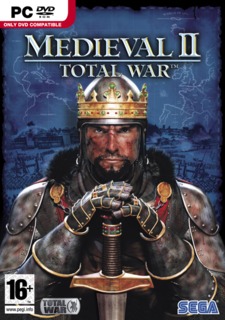It's the Little Things
What makes Medieval 2: Total War both as good as and vastly different (and "great" but not "superb") from other titles in the series are the little things the designers did to bring home this installment.
The first thing one notices is the beauty of the world in which you play. Although the colors aren't as apparently rich as in Rome: Total War, but the dulled appearance fits in well with the Medieval theme of the game. On the tactical map, however, the battlefields on which you will command your armies are sights to behold. You'll almost feel bad for covering the grasses and flowers of European battlefields with your and your enemy's dead (well, maybe not so much your enemy's). Even on the lower settings, the tactical maps are very well done.
The battles themselves can be quite epic, assuming your machine is high-powered enough to run it (my machine starts to lag when there are 3,000 or more units on a map, and becomes viciously slow when there are in excess of 6,000); a city or fortress siege in particular can be an awesome thing to behold. And while it's true that the "clone armies" of the earlier games are gone, there's still enough repetition in the ranks to make you say, "Wait a minute, I've seen you before."
But unit repetitiveness aside, a great visual aspect of the soldiers is the graphic representation of damage. After enough blows from swords and arrow punctures, a unit will drop to the ground as a blood-soaked mess; and you can quickly get a sense of just how much of a battle your units have suffered by looking at the multitude of wounds your soldiers are sporting.
The soundtrack, too, while boasting a great variety of well produced scores which capture the theme of the game very well, also manages to become repetitive after a while. The sound effects are otherwise standard, which is a shame given the great production quality of the music behind the battles.
All together, the variety and rendering of the units, battlefields, and the sound effects make the battle experience something that you don’t want to miss – and given how long battles can last with no time limit, this will take up most of your time in the game (yes, there’s the auto resolve option, but why pass up a chance to show off your tactical prowess?).
I’m somewhat ambivalent about the merchant unit. Useful on the one hand (increased income, merchant’s guilds to reduce the costs of building) but a burden to keep track of on the other – especially when a wily, foreign merchant makes his way into your territory and begins buying out your guys’ assets!
For those initiated into the Total War series, learning the basics will not take long. What takes more time to get the hang of - particularly if you're a Catholic faction, which you will be in your first campaign game - is the larger role diplomacy plays in the game, specifically when it comes time to elect a new pope. Balancing alliances while not getting the pope on your bad side takes some time to learn, and very little will frustrate you more than the pope's threat to excommunicate your faction if you continue to wage war on an enemy when you're on the verge of ultimate victory.
A change I’ve particularly enjoyed is how the unit queue works. As a city or castle expands, more units can be recruited in the span of one turn, so long as there’s the manpower available to recruit that unit. This system allows for both large armies to come to your calling within a turn while forcing you to diversify your armies for the greatest possible impact.
One of the flaws of the game which can detract from gameplay is the AI. Often in close quarters (like a siege), units will fail to engage each other, or if you order a mass of units to attack a unit, even with plenty of room to maneuver they might sit back and let one unit do all the work. The pope also makes little distinction between aggressor and defender when handing down warnings of excommunication; if you’re beating back an enemy which attacked you first, you’re just as liable to get a warning as the other faction.
You’ll also find that chasing down heretics, witches and rebels becomes tiresome after too long; when you’ve got an army on the march, having to divert resources to tend to the smaller tasks back at home can seem more like a chore than integral element of the game.
Flaws aside, the game itself provides an immersive, easily addictive experience that is not to be missed for fans of either the Total War series or strategy games in general. A standout game in a standout series.
~*~*~*~
Reviewer’s system specs:
Toshiba Satellite P105-S921: 1.83 GHz processor speed (Centrino Duo), 1 GB RAM, NVIDIA GeForce Go 7900 GS.

